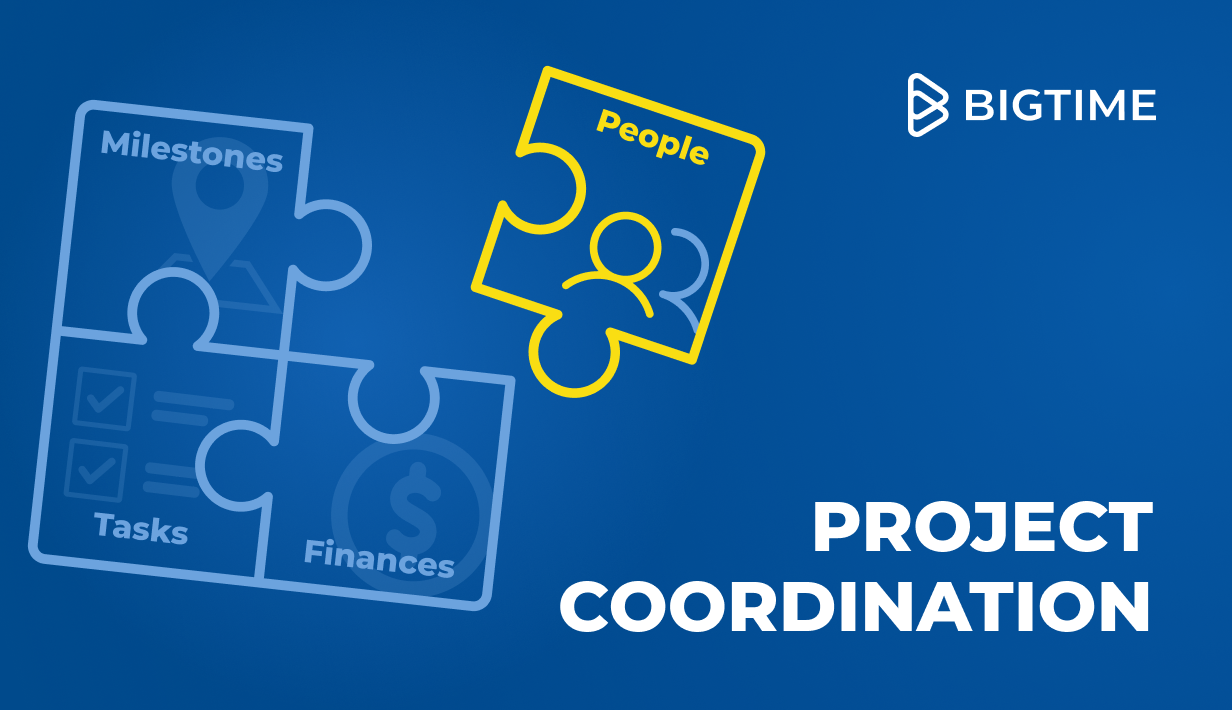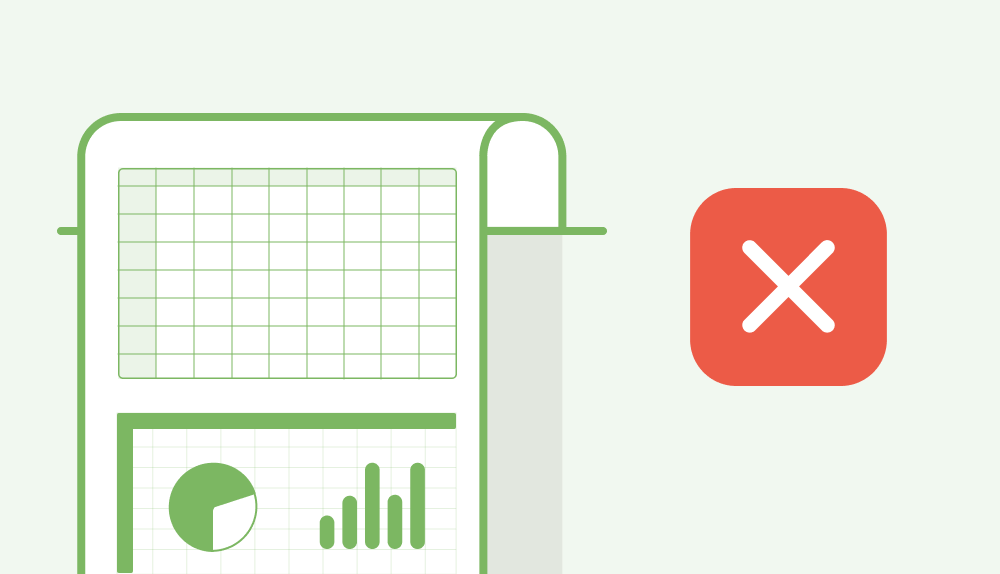Specialists, tasks, milestones, dependencies, teams, and timelines… and dozens of other operations. In today’s competitive landscape, project managers need to consider all of these factors to successfully complete the projects. Still, regardless of the industry, project coordination is what really binds all of those elements together.
What’s in this article?
- What is project coordination? Definition
- What’s the difference between project coordination and project management?
- Why is project coordination so important?
- What are the responsibilities of a project coordinator?
- What skills should a good project coordinator have?
What is Project Coordination?
Project coordination is keeping the different parts of a project working smoothly together. It involves all the tasks that aim to keep the project on track: from creating project timeline and organizing project tasks to managing project schedule and tracking progress.
Project coordination can sometimes refer to successfully managing multiple projects at the same time. In that case, project coordinator’s job is to ensure all projects have everything they need to succeed: from the right specialists, to the right tools.
Project Coordination vs Project Management – What’s The Difference?
At first glance, the difference between project coordination and project management might not be immediately clear. But in reality, it’s quite straightforward.
Project coordination vs project management – comparison
Project coordination is primarily about supporting the project execution. This includes managing logistics, facilitating communication between internal and external teams, maintaining schedules, and handling documentation—both within the project team and with external stakeholders. In some cases, the role can expand to coordinating multiple projects simultaneously, especially when there are shared resources, overlapping timelines, or cross-functional dependencies that need to be addressed.
Project management, on the other hand, is centered on leading the project from start to finish. It involves setting the overall vision, making strategic decisions, managing risks, allocating resources, and ensuring the project meets its goals. Unlike coordination, project management is typically more internally focused, concentrating on delivering results within the defined scope, time, and budget.
Why Project Coordination is Important For Your Business
The success of the entire project depends on the quality of its management—and that’s exactly what project coordination aims to improve.
With that process in place, project managers can:
- Ensure seamless communication between key stakeholders and, when necessary, between other projects.
- Improve organizational processes within the project, such as skill and resource planning, brainstorming, or problem solving.
- Streamline workflows, manage tasks, and avoid errors and schedule conflicts.
- Monitor project budget, optimize overheads and ensure the project won’t exceed the planned expenses.
- Track project progress to ensure its success.
The Key Responsibilities of Project Coordinator
In project coordination, everything revolves around the person that glues together all the key factors: the project coordinator. Project coordinator serves as a heart of the project and their role is critical for maintaining alignment between different departments or contributors, especially in complex or multi-phase projects. But what are really the duties of a project coordinator?
Project coordinator’s responsibilities include:
Defining and Organizing Deliverables
The team members can only deliver a project when they are working on a clearly defined common goal. Identifying and establishing it is one of the main duties of a project coordinator, whose organizational skills should be exceptional in every way.
Project coordinator plays a key role in clarifying what needs to be delivered and breaking those deliverables into manageable tasks. They should be able to outline requirements, assign responsibilities, complete resource allocation and ensure that each component aligns with the overall project goals. This helps establish a shared understanding and lays the foundation for project running smoothly.
Creating Project Timelines
Don’t know what’s happening next in your project? A good project coordinator should change that by providing realistic and structured project timelines. This involves identifying task dependencies, estimating durations, and aligning schedules with team availability.
Importantly, the deliverables themselves shouldn’t be the only factor included in a comprehensive project plan. Consult other project managers, as well as your own team members to ensure that no obstacle stands in the way of your project’s success.
Delivering Projects on Schedule
Having a plan is one thing; following it to the letter during complex projects is a completely different challenge. With ever-changing project scopes and continuous feedback, it’s the project coordinator’s job to ensure that alterations won’t affect the final deadline. For that reason, project managers should proactively monitor progress, flag delays, and adjust schedules as needed to meet deadlines to avoid unnecessary delays and, consequently, project failure.
Monitoring Project Finances
Every penny counts – especially when project profitability is at stake and project status constantly changes. That is why finance monitoring is one of the most common coordination responsibilities.
Although project coordinators may not control the full project budget, they often support financial oversight by tracking expenditures, monitoring resource use, and flagging cost variances. They may also assist with generating budget reports or forecasts, ensuring financial transparency and supporting informed decision-making.
Streamlining Communication and Collaboration
Project team members, other project managers, contractors, executives… With dozens of stakeholders present, finding a common ground is one of the most important responsibilities and core skills of a project coordinator.
Coordinators act as the central point of contact, ensuring that information flows smoothly between team members, stakeholders, and departments. They facilitate efficient communication by organizing meetings, providing status updates, and resolving communication bottlenecks, ensuring all the key stakeholders are on the same page.
Creating and Analyzing Project Documentation
Leaving a paper trail for every decision and every technicality might seem burdensome, but it is also essential for the project completion. Such administrative tasks are also one of the project coordinator duties.
Project coordinators create, maintain, and analyze key project documents—such as status reports, task trackers, meeting notes, and risk logs. This documentation helps keep stakeholders informed, supports compliance, and captures lessons learned for future initiatives.
Essential Project Coordination Skills For Project Coordinator
Successful project coordination combines soft skills with operation management, requiring a broad scope of skills from those who intend to be successful in this field. But what are really the skills that make or break a project coordinator?
Time and Project Management
There’s no denying that project coordination starts with task management. From effective planning to the creation of project budget, from scheduling meetings to tracking deadlines and dependencies, coordinators must be able to manage their own time while also tracking project progress. This is one of their key responsibilities, as well as a solid base for the project success.
Problem Solving and Decision Making
Despite the best efforts in project coordination, projects rarely go exactly as planned, which is why problem-solving and decision-making skills are essential. Project coordinators must be able to think critically, identify issues early, evaluate potential solutions, and make sound decisions to keep the project moving forward. While major decisions may rest with the project manager, coordinators are often the first to spot challenges and play a key role in resolving them quickly and effectively.
Attention to Detail
In project management, a butterfly effect is not a rare occurrence. Missing a single tiny detail might later lead to delays and cash flow issues – and that is why project coordinator should pay so much attention to the smallest things.
From tracking task statuses to updating schedules and managing documentation, attention to detail ensures that nothing is overlooked. A coordinator who catches discrepancies, follows through on small but important actions, and double-checks work contributes significantly to maintaining quality, avoiding errors, and keeping the team aligned.
Best Practices and Helpful Project Coordination Tips
Effective project coordination is about more than just staying organized—it’s about enabling smooth execution, clear communication, and timely delivery. To ensure that this is the case for your project coordination efforts, you should:
- Start with Clear Project Deliverables and Project Scope. Define success early and break down goals into manageable parts, ensuring all stakeholders align on scope.
- Develop a Realistic and Structured Timeline. Use tools like Gantt chart project management software to build a clear schedule, account for task dependencies, and update timelines regularly to reflect real-time progress.
- Establish Strong Communication Channels. Hold consistent check-ins, leverage platforms like Slack or Teams, and encourage proactive updates among team members.
- Maintain Thorough Documentation. Centralize important documents in a single project management software, track key decisions, and ensure easy access for all team members.
- Monitor Progress and Stay Flexible. Use task-tracking tools to keep milestones in check, adjust plans as needed, and utilize dashboards for real-time project visibility.
- Foster Cross-Team Collaboration. Understand each team’s role, facilitate smooth handoffs, and act as a communication bridge to reduce silos and enhance teamwork.
- Anticipate and Manage Risks. All mitigation strategies begin with anticipating challenges in daily tasks. Log potential issues early, offer solutions when problems arise, and build contingency plans to prepare for unexpected setbacks.
Master Project Coordination with BigTime
Successful project outcomes depend not only on the skills of a project coordinator and their team members, but also on the tools that facilitate their cooperation. BigTime is one of such tools.
With BigTime’s project portfolio management, you can not only streamline processes, but also:
- Test out different project scenarios in just a few clicks and choose the best plan for your business – every time.
- Complete resource allocation without a single error while monitoring all the dependencies and calculating the costs of planned work.
- Monitor work progress in the real time – every change will instantly appear in the system.
- Foster collaborative environment in your team and share up to date project information with all the key stakeholders and the entire team.
- Analyze and report the project performance in seconds with support from our AI tools and improve your processes and future projects as you go.
Sounds good? We would love to show you all of our features! Simply with BigTime and let us show you how to boost profits with our project management software.




